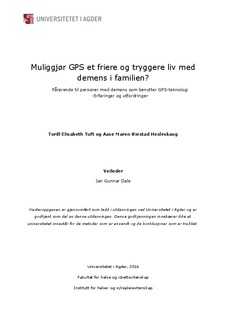| dc.contributor.author | Hesleskaug, Aase Maren Øiestad | |
| dc.contributor.author | Tuft, Torill Elisabeth | |
| dc.date.accessioned | 2016-09-28T09:14:10Z | |
| dc.date.available | 2016-09-28T09:14:10Z | |
| dc.date.issued | 2016 | |
| dc.identifier.uri | http://hdl.handle.net/11250/2411216 | |
| dc.description | Masteroppgave i helse- og sosialinformatikk- Universitetet i Agder, 2016 | nb_NO |
| dc.description.abstract | According to statistics, there will be an increasing number of elderly people and people with dementia in the future. The importance of the relatives are being emphasized as an increasing resource in developing the public health care and caring services in the municipality and many of them contribute with an outstanding effort helping their closest family members. These persons can be important contributors for the person with dementia, in such a way that the person is able to continue with an active and purposeful life in their own home. Welfare technology exists as one of the devices to support that. Based on that it was interesting to enlighten and concentrate on the perspective with relatives in relation to persons with dementia who make use of GPS-Technology at home. The survey focused on what kind of experiences and challenges the relatives to persons with dementia, experience in relation to the usage of GPS-technology. The survey was accomplished with a qualitative approach and by interviewing ten relatives to persons with dementia, located in two municipalities in eastern Norway. Increased safety for the relatives and more freedom to live an independent life for the persons with dementia, were some discoveries made in the survey. None of the relatives had any doubts about using localization technology on behalf of their immediate family member. One of the challenges the relatives highlighted was to make the persons with dementia bring along the GPS when they are not at home. The relatives had several good suggestions/advices how to develop the technology, which will be of upmost importance in the everyday life. It is possible to conclude that the GPS can be looked upon as a part of a bigger entirety of adjusted measures/actions dedicated this target group. An individual assessment and to reckon the family as a unity, is considered to be important to be able to offer the correct kind of technology at the right time. Keywords: Relatives, GPS, dementia, burden, welfare technology, primary health care. | nb_NO |
| dc.language.iso | nob | nb_NO |
| dc.publisher | Universitetet i Agder ; University of Agder | nb_NO |
| dc.subject | pårørende | nb_NO |
| dc.subject | GPS | nb_NO |
| dc.subject | demens | nb_NO |
| dc.subject | omsorgsbyrde | nb_NO |
| dc.subject | velferdsteknologi | nb_NO |
| dc.subject | kommunal helse- og omsorgstjeneste | nb_NO |
| dc.subject | relatives | nb_NO |
| dc.subject | dementia | nb_NO |
| dc.subject | welfare technology | nb_NO |
| dc.subject | primary health care | nb_NO |
| dc.subject.classification | HSI500 | |
| dc.title | Muliggjør GPS et friere og tryggere liv med demens i familien? : pårørende til personer med demens som benytter GPS-teknologi -Erfaringer og utfordringer | nb_NO |
| dc.type | Master thesis | nb_NO |
| dc.subject.nsi | VDP::Technology: 500::Information and communication technology: 550 | nb_NO |
| dc.source.pagenumber | 71 s. | nb_NO |
